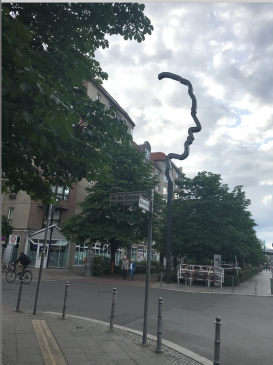Archive
The Temptation of “More”
 What does it mean, to tell an unvarnished story? To describe our travails, our emotions, our pain or grief, as they are, without adding, without feeling that we need to enhance, turn on searchlights, say “but wait, there’s more,” bring in makeup and costume departments?
What does it mean, to tell an unvarnished story? To describe our travails, our emotions, our pain or grief, as they are, without adding, without feeling that we need to enhance, turn on searchlights, say “but wait, there’s more,” bring in makeup and costume departments?
These are the thoughts that came to me watching the Arte TV channel presentation of a documentary, “Born in Evin” by German-Iranian director Maryam Zaree.The story is that of a quest so many people, no matter race, creed or country, go through at some point or other: who am I, where do I come from, what’s my story? There are so many narratives, so many pasts, so many ways to have lived through it and to relive it, that the process often remains interesting and even banal accounts can offer at least some nuggets that make us more aware, wiser perhaps, able to identify on some level with the story teller.
In this particular case, the director goes way back, to her birth in an Iranian prison in the Islamic Republic of Iran some thirty-nine years ago, when her parents were arrested because of their anti-regime activities. Later, Maryam Zaree and her mother emigrated to Germany where she was brought up but the past never ceased to intrigue and perhaps even haunt her, until, with the help of her mother and others, she reconstructs those times and what followed. It’s an interesting story, and also one rather different from the myriad ones told and retold ad nauseam by refugees and exiles in memoirs, films, novels.
Never mind that in this kind of narrative, after a while, no matter how original the material, things always become repetitive as we’ve turned the page of that book once too often. What bothers me more is the mental CGI. Much like the makeover apps allowing Chinese teenagers to enhance face and body for their social media followers, everyone who tells a story needs to make it stronger, prettier, more relatable.
Thus, in the presentation to this documentary, we hear that Maryam Rezee travelled to numerous destinations in order to hear the stories of people who have lived extreme situations in Iranian prisons or detention centers or more generally have gone through some kind of gruelling process. The people the director meets relate their experience, their memories of what they lived through or witnessed. Superfluous is the comment of the Arte channel, taken–or not– from the film I haven’t yet seen–that it was difficult to get people to speak as Iran is still the Islamic Republic and would retaliate against people critical of that regime. That is an absurd statement. Over the last forty years, I have met, known and written about countless Iranian exiles of all political persuasions and with memories covering a wide range of experiences. I have yet to see one refusing to talk for security reasons. On the contrary, they are often boringly eager to narrate their past, their experience, their problems, which every single one considers unique and never gone through by anyone else. Not one, ever, refuses to share. Saying that they talk under cover or have to be persuaded to give their own testimony may give it a thriller sheen (a genre, alas, more ubiquitous by the day) but it’s simply not true. We Iranians love to enhance not only our stories but history itself. We don’t mind lowering our voice to add that we may well be under surveillance, as the Iranian grocer in El Paso, Texas, or the university student in Heidelberg, Germany does when stating that they’re being followed for representing a threat to the Islamic Republic as they know secret facts that would sink the regime if revealed, etc.
The MEK, a shadowy exile group hated by Iranians inside and outside the country for their cult-like presence actively planning regime change
I see our myth-making capacity, a part of the Iranian psyche, as a failure of personality. Not everone can be as rational as the philosophers of the French Enlightnment but falling into the exact opposite is not admirable, no matter what we think. Inventing facts or presenting vague hunches as life-threatening is not admirable. The Islamic Republic, repulsive as it is, is busy on many fronts keeping itself relevant or viable. I don’t believe it can, at the same time, plan the demise of the millions of Iranian exiles scattered in different parts of the globe who have a low opinion of the Tehran regime and are not shy about expressing their feelings. And no, they don’t court swift reprisal when they do so. We love to wrap ourselves in narratives, thus painting ourselves as worthy descendants of the heroes of Ferdowsi’s Book of Kings. But rewriting reality, whining about being perpetual victims of fate and the nefarious plans of the powers-that-be and, also, believing we are far more relevant than we actually are, prevents us from walking on the solid ground of the here and now. Enhancing reality casts it in shadows and prevents the actual story from being told–which, surely, it deserves.
The Lessons of Berlin

Not far from the bunker where Hitler and his cronies, Eva Braun, Goebbbels etc. all these hideous nightmarish figures, committed suicide, not far from the German chancery, rises in the Berlin sky a wrought-iron profile of Georg Elser, the young carpenter who in 1939, foreseeing the destruction caused by the war that had just started, made an ill-fated attempt to assassinate Hitler. (Hitler didn’t die, Elser was caught and sent to Dachau where he was shot in 1945, for some reason spared until then.)
Under the avalanche of horrible news–the unconscionable tearing apart of families in the United States, the turning away on European shores of migrants fleeing impossible conditions in their own countries, the reelection of Erdogan whose unlimited new powers can truly crush the Turks and definitely do away with Ataturk’s legacy, the resignation of Supreme Court Justice Kennedy to be replaced by who knows which Trump flunky, corrupt power-crazed strongmen coming to power in too many places we thought safe from extremism, we can only draw comfort from the “this too shall pass” thought. For me, indignant at the start of each day with the news, nothing good or consoling comes to mind as much as a recent visit to Berlin–my first, I’m ashamed to say. Read more…
